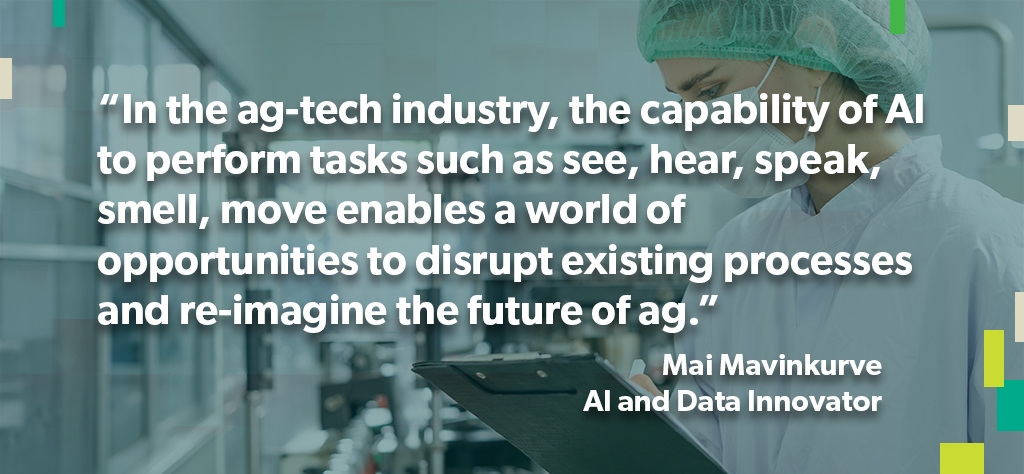Artificial intelligence, and the surprising ways it can help the agrifood sector
- Posted:

One of the most important traits in an innovative mindset is the willingness to try just about anything. Such a mindset moves not only products forward, but sectors forward, often helping step into a more technologically advanced generation.
The innovators in Canada’s plant-based food, feed and ingredient sector possess an abundance of this trait, and it’s helped them significantly in meeting the growing global demand for protein. As technology in other sectors advances, however, there’s opportunity for these innovators to utilize this trait in taking these advancements and incorporating them into their own efforts.
One of the most significant areas of opportunity is artificial intelligence (AI). Industries throughout Canada are using AI for everything from facial recognition to art creation, but the technology has remained under-utilized in both the agriculture and agrifood sectors.
Mai Mavinkurve, an AI and data innovator, wants to see this change.
“In the ag-tech industry, the capability of AI to perform tasks such as see, hear, speak, smell, move enables a world of opportunities to disrupt existing processes and re-imagine the future of ag,” she said. “AI is still a nascent field in ag. As such, almost all these capabilities of AI are underutilized in this industry.”
Mavinkurve said that, thus far, most AI in the ag-related fields has focused on on-farm uses, such as identifying weeds in the field and robotic harvesting. AI solutions in the agrifood realm have been developed—particularly in the area of quality assurance—but there’s significant room for expansion.
By focusing on AI’s capabilities in the areas of human senses, most significantly smell and taste, ingredient and food developers can optimize processes such as recipe development, taste testing and functionality testing—all in an effort to provide the high-quality products consumers are looking for.
“The proper adoption of AI and data-driven technologies enables a step change in the agrifood industry—one that can enable process optimization, social impact, and enable the industry,” Mavinkurve said.
While implementing such AI technology isn’t as easy as flipping a switch, Mavinkurve explained there are steps a company can take to prepare itself before fully committing to an AI strategy. She recommends the following:
- Understand the business problem or outcome you are trying to achieve;
- Research and understand how AI may or may not help with that problem;
- Network and connect with those in the industry who may also be embarking on an AI journey;
- Understand how to build a data-driven culture in your company;
- Understand the impacts of the AI solution you are proposing; and
- Consider the human resource requirements or supplier requirements needed to develop your solution.
By knowing what to expect, and fully preparing ahead of time, companies across Canada’s plant-based food and ingredients sector can build out their AI strategies, creating technologies that can help them meet the growing global demand for high-quality, sustainable protein.
Protein Industries Canada has launched a new program to support Canada’s plant-based companies in accessing and utilizing artificial intelligence technology. To learn how your company can take part, visit our Artificial Intelligence Program page.
